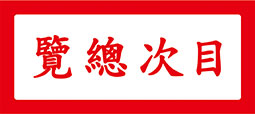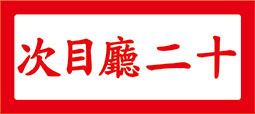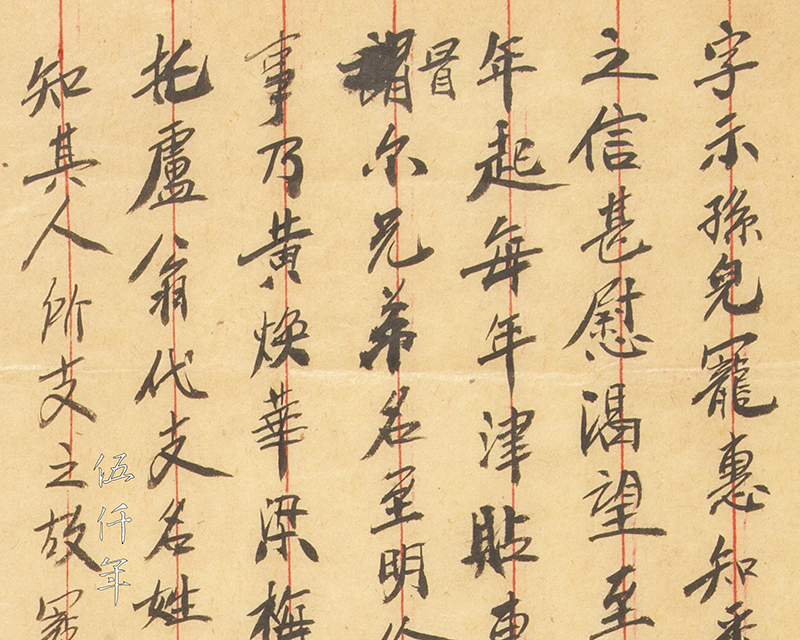
Detail of letter to Wang Ch’ung-hui from grandfather Yüan-shen
Dr. Wang Ch’ung-hui (王寵惠) was born in Hong Kong, a city that synthesized the cultures of East and West. His grandfather and father were both pious Christians, the grandfather Yüan-shen (王元深) was a preacher of the Chinese Rhenish Church Hong Kong Synod, and the father Yü-ch’u (王煜初) was a minister of the same Church. The school he attended in his youth was St. Paul’s College, Hong Kong, which was also founded by a Christian missionary Rev. Vincent John Stanton. One may postulate that the accomplishments Wang attained during his lifetime in the judicial discipline and foreign affairs, were cultivated through the learning and outlook derived from the cultural fusion of East and West, which in essence originated in his childhood.
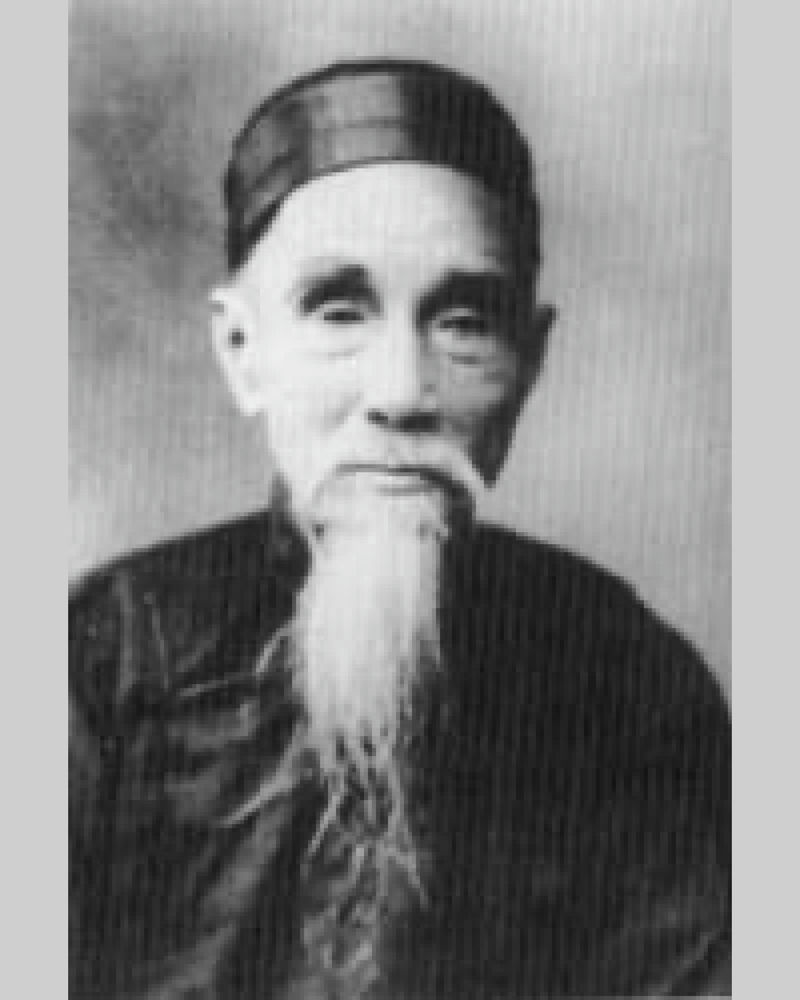
Portrait of Wang Yüan-shen. Photograph courtesy Christian Weekly
Grandfather Yüan-shen (王元深 1817-1914) was a native of Tungkuan, Kwangtung province. In his early years, he was a merchant, in the 25th year of the Tao-kuang reign (1845), he relocated to Hong Kong, in the 27th year of the Tao-kuang reign (1847), he was baptized by the German Lutheran missionary Karl Gützlaff and became a Christian. He then worked as an assistant to the German missionary Ferdinand Genähr of the Rhenish Mission, whom he accompanied on travels across Kwangtung province, preaching and practicing medicine. In the 6th year of the Kuang-hsü reign (1880), grandfather Yüan-shen relocated from Kwangtung to Hong Kong, and assisted in the founding of the Chinese Rhenish Church Hong Kong Synod in the 3rd year of the Republic (1914). He had two sons, Yü-ch’u (王煜初) and Ch’ien-ho (王謙和), both were ministers of the Chinese Rhenish Church Hong Kong Synod. His publications are Sheng-tao tung-lai k’ao (A Study of the Sacred Journey Eastbound 聖道東來考) and Li-chien ming-cheng chi (A Record of Trials and Affirmations 歷艱明證記).
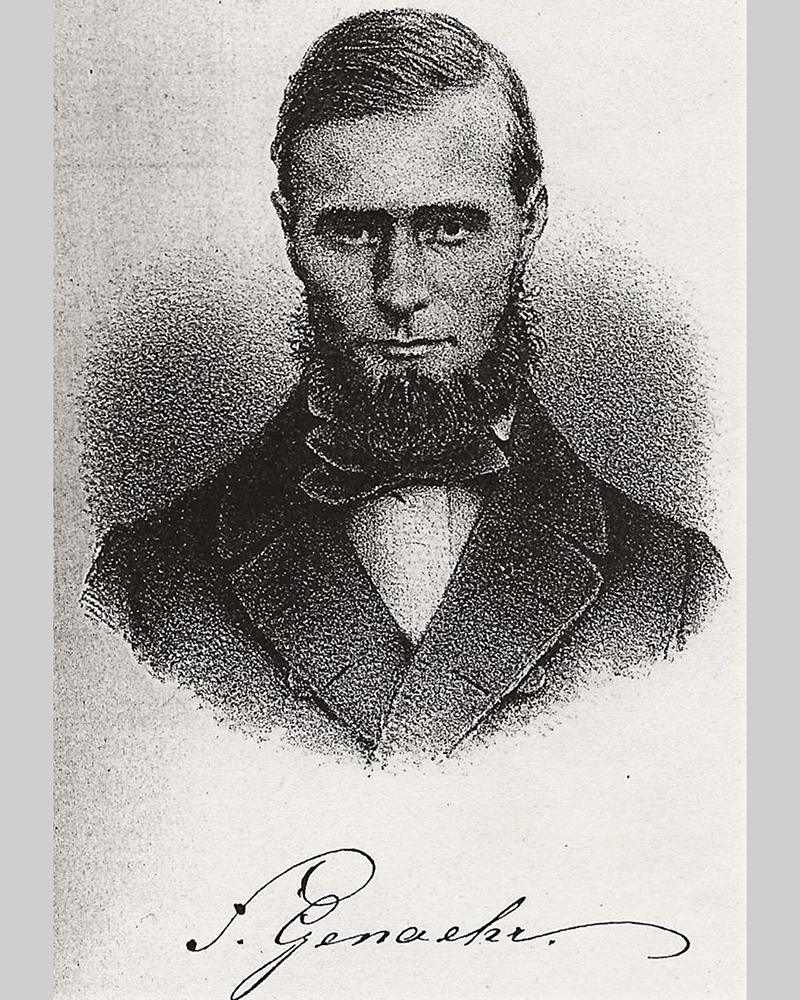
Portrait of German missionary Ferdinand Genähr. Photograph courtesy Wikipedia
Dr. Wang Ch’ung-hui had treasured two letters written by his grandfather. The first letter was written in the 34th year of the Kuang-hsü reign (1908), the second letter was written in the first year of the Hsüan-t’ung reign (1909). In the 31st year of the Kuang-hsü reign (1905), Dr. Wang attained his doctorate degree from Yale Law School of Yale University, and thereafter he left for Britain. In the 33rd year of the Kuang-hsü reign (1907), he published an English translation of The German Civil Code in London. He stayed in London until the 3rd year of the Hsüan-t’ung reign (1911) before returning to China. These two letters by grandfather Yüan-shen were written to Dr. Wang when he was residing in Britain.
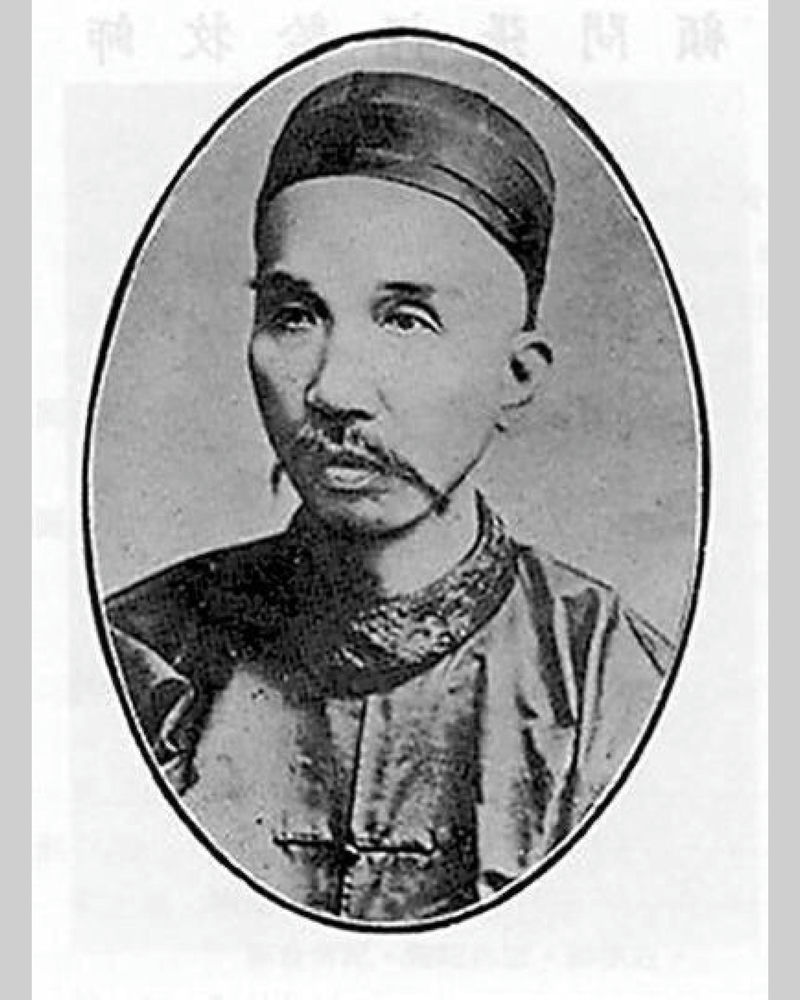
Portrait of Wang Yü-ch’u. Photograph courtesy Mr. Hsia Ho-shun
Dr. Wang’s father Yü-ch’u (王煜初 1843-1902) passed away in the 28th year of the Kuang-hsü reign (1902), his uncle Ch’ien-ho (王謙和) passed away in the 33rd year of the Kuang-hsü reign (1907), none of them reached old age. In the 28th year of the Kuang-hsü reign (1902), Dr. Wang was only twenty two years old, hence grandfather Yüan-shen had to take on the role of a stern father in the subsequent years, writing letters of instructions and encouragements from afar.
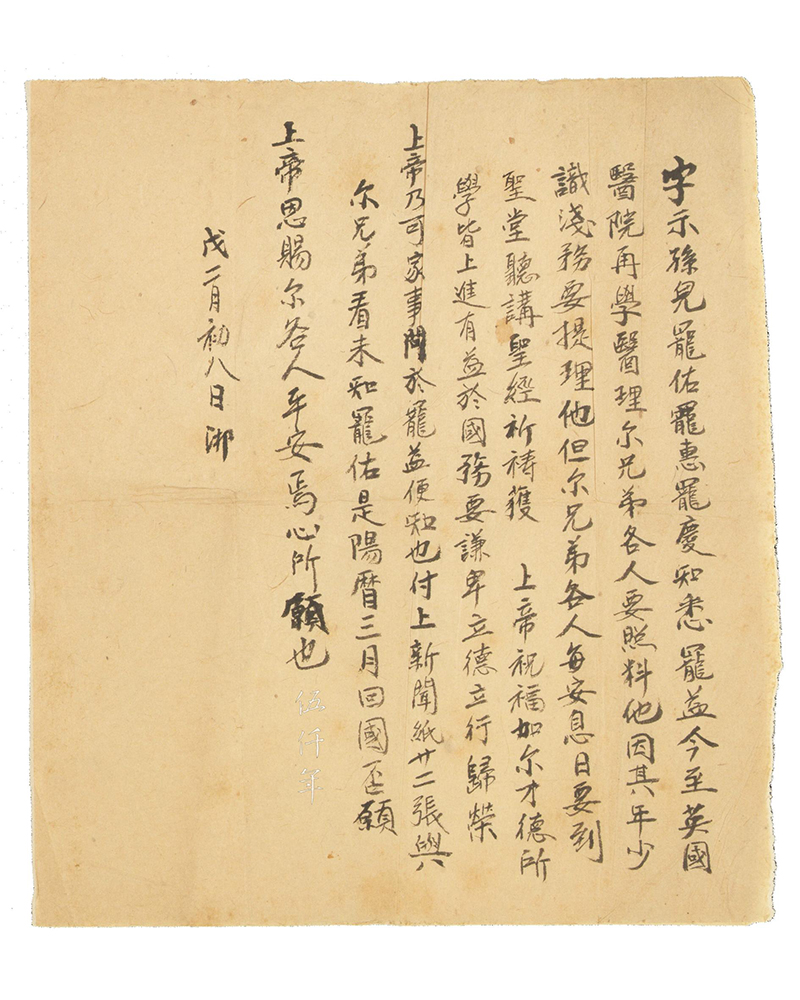
Letter to grandsons Ch’ung-yu, Ch’ung-hui, Ch’ung-ch’ing from Wang Yüan-shen. Photograph courtesy Ms. Wang I-jen and Mr. Wang Shou-cheng
The first letter with envelope: Addressed to grandsons Ch’ung-yu (王寵佑), Ch’ung-hui (王寵惠) and Ch’ung-ch’ing (王寵慶) from grandfather Wang Yüan-shen (王元深)
Dated: Year of wu-shen (戊申), the 34th year of the Kuang-hsü reign (1908).
The letter reads:
“ These words are for grandsons Ch’ung-yu, Ch’ung-hui, Ch’ung-ch’ing: I am aware Ch’ung-i (王寵益) is now enrolled in a British hospital to study medicine again. Each of you brothers should look after him, for he is young and his understanding superficial, he ought to be supervised. However all of you should go to church on Sabbath for sermons and prayers, to receive God’s blessings on your virtues and actions, to advance your studies, so as to benefit the affairs of our country. You should be humble, demonstrate your virtues and actions, you can then honour God. You can ask Ch’ung-i about news of the family. I am enclosing twenty two sheets of newspaper clippings for your readings. I do not know yet whether Ch’ung-yu is returning to our country in March of the Gregorian calendar. I wish God will bless you with well-being, that is my hope. Written on 8th February, in the year of wu (戊).”
The letter mentioned Ch’ung-i, who was the second youngest brother of Dr. Wang. He attained his doctorate degree from the Medical School of the University of Edinburgh. In the 9th year of the Republic (1920), he left Britain for Hong Kong, and was appointed professor at the Department of Pathology of the University of Hong Kong, becoming the first ethnically Chinese professor there. Ch’ung-yu was the third eldest brother, he graduated from the Department of Mineralogy and Geology of Columbia University. Ch’ung-ch’ing was the first youngest brother. Grandfather Yüan-shen earnestly reminded the brothers to attend church services, and wished that their studies could progress as to benefit China.
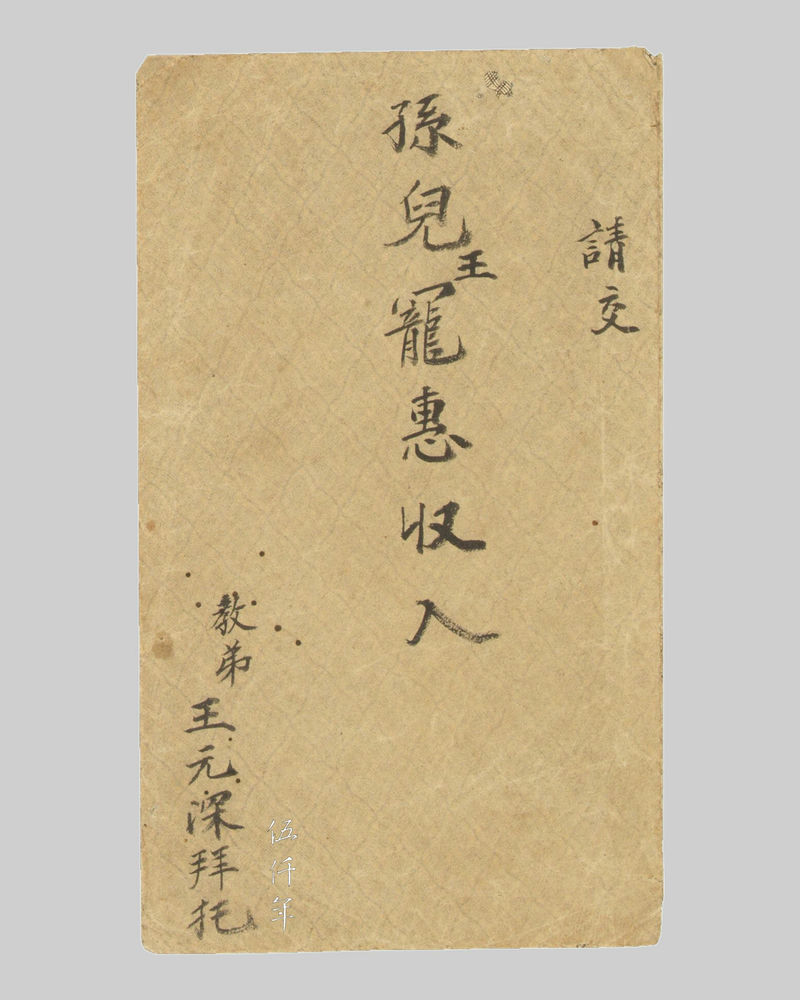
Envelope of letter to Wang Ch’ung-hui from grandfather Yüan-shen. Photograph courtesy Ms. Wang I-jen and Mr. Wang Shou-cheng
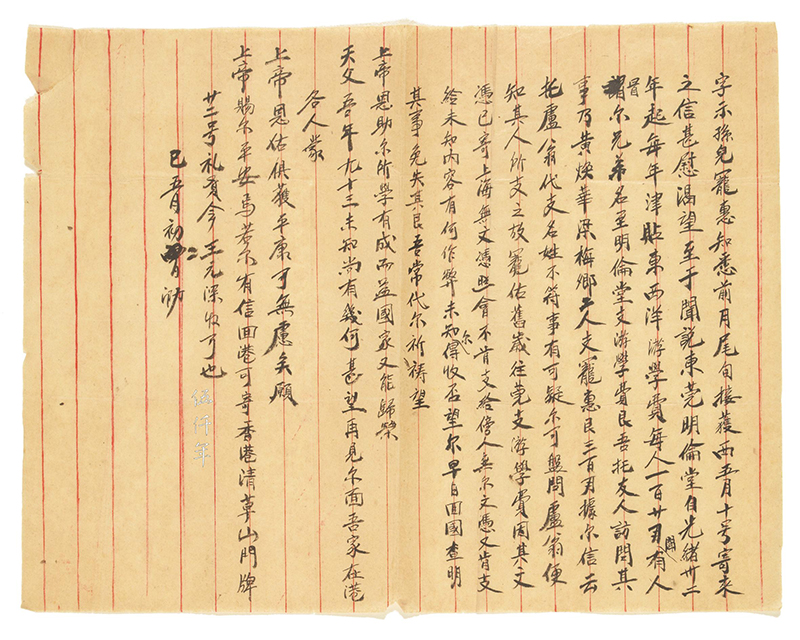
Letter to Wang Ch’ung-hui from grandfather Yüan-shen. Photograph courtesy Ms. Wang I-jen and Mr. Wang Shou-cheng
The second letter: Addressed to grandson Ch’ung-hui (王寵惠) from grandfather Wang Yüan-shen (王元深)
Dated: Year of chi-yu (己酉), the first year of Hsüan-t’ung reign (1909).
The letter reads:
“These words are for grandson Ch’ung-hui: I am aware that at the end of last month, after I received your letter dated 10 th May, my yearning has been much gratified. As for the rumour that Ming-lun T’ang of Tungkuan has been distributing scholarships since the 32nd year of the Kuang-hsü reign (1908), for overseas studies either in the East or in the West, and each student is to be awarded the sum of one hundred and twenty taels. I heard some people used your name and that of your brother, and went to Ming-lun T’ang to receive scholarships. I asked a friend to investigate, the two involved were Huang Huan-hua (黃煥華) and Liang Mei-hsiang (梁梅鄉), and under your name a sum of three hundred taels was withdrawn. According to your letter, you asked a Mr. Lu to draw money on your behalf, yet the names did not match. The case is suspicious, you can interrogate Mr. Lu, to know why others drew money. In previous years, Ch’ung-yu went to Tungkuan to receive the scholarship, because his diploma had already been mailed to Shanghai, without any note attached to the diploma, money could not be paid to others, while without your diploma, they were still willing to pay. One does not know whether there is fraud involved, nor does one know whether you will receive the scholarship. I hope you will return home soon to investigate this incident, to avoid losing this money. I frequently pray on your behalf, wishing God will be lenient with his help, for your studies to gain outstanding accomplishments, so as to benefit the country, and at the same time, you can honour God. I am ninety three years old, not knowing how many years are left, I very much hope to see you again. My home is in Hong Kong, for everyone to receive God’s blessings, to be rewarded with both well-being and healthiness, one can have no more worry! I wish God will grant you safety. If you write back to Hong Kong, you can send to Wang Yüan-shen, Chinese Rhenish Church, No. 22 Ch’ing-ts’ao Hill, Hong Kong. Written on 2nd May, the year of chi (己).”
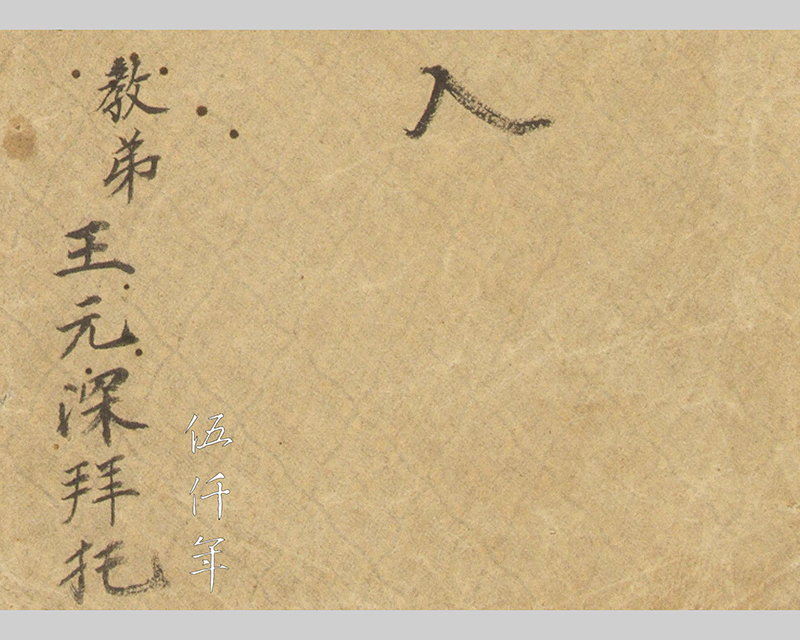
Envelope detail of letter to Wang Ch’ung-hui from grandfather Yüan-shen
In the year chi-yu (己酉), grandfather Yüan-shen was ninety three, five years later, he passed away at the age of ninety eight. In these two letters, he repeatedly encouraged the grandsons to achieve notable accomplishments in their studies, in order to bring benefits to the country. One is entwined in thoughts by reading these lines. At the end of the Ch’ing dynasty and in the early years of the Republic, for students who went abroad to further their studies, many were driven by the notion: Chinese Learning as Substance, Western Learning as Application, as well as an altruistic objective to change the course of China. They were not mainly motivated by personal successes and advancements, and whenever the elderly generation composed words of encouragements, they would conclude by telling the students to complete their studies as to assist the world. Time has moved on and epochs have passed, such altruistic sentiment will now quite likely be ridiculed by our world at large.
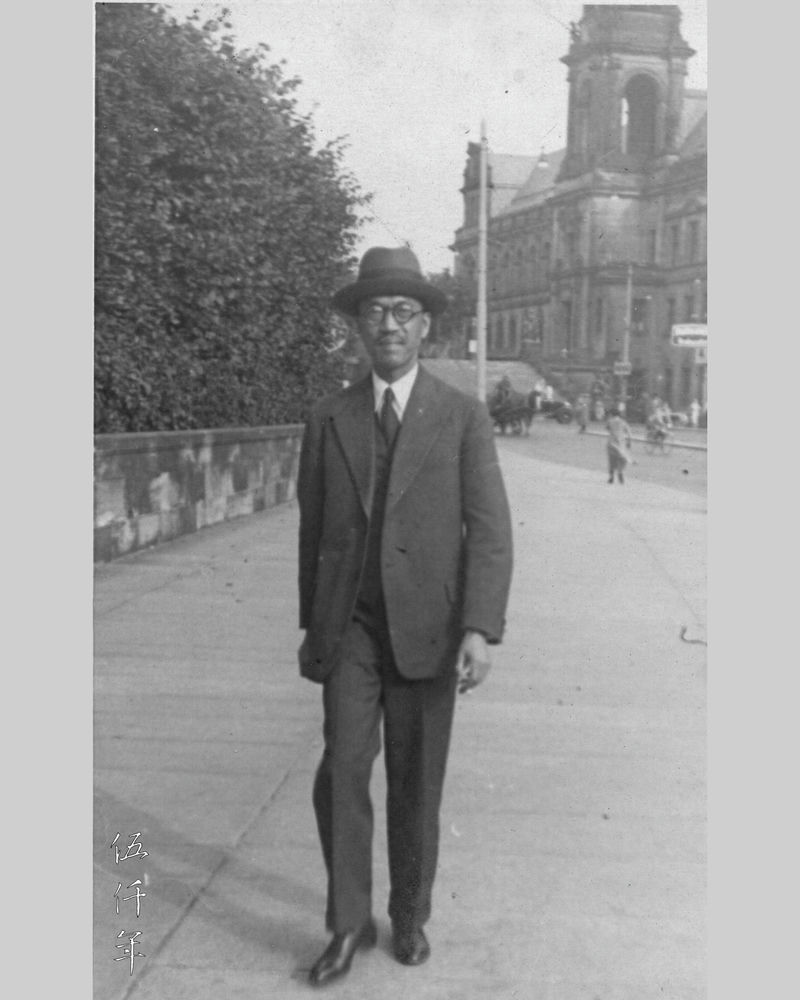
Portrait of Dr. Wang Ch’ung-hui in Europe. Photograph courtesy Ms. Wang I-jen and Mr. Wang Shou-cheng
Related Contents:
